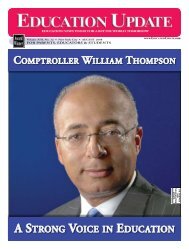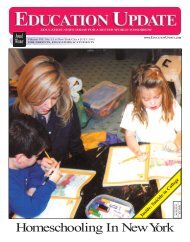22 Music, art & Dance ■ EDUCATION UPDATE ■ NOV/DEC 2010Juilliard String Quartet WelcomesNew First Violinist Joseph LinPlaywright UsesTheater to EducateJoseph LinSteve J. ShermanJuilliard President Joseph W. Polisiannounced recently that 32-year-old violinistJoseph Lin, an alumnus of Harvardand The Juilliard School Pre-College,will join the Juilliard String Quartetas first violinist beginning in 2011. Healso becomes a member of the Juilliardviolin faculty beginning with the fall2011 semester. Mr. Lin currently is onleave from his position as a professor atCornell, spending time in Asia to studyChinese music. He returns to the US tocomplete the spring semester at Cornellbefore joining the other members of theJuilliard Quartet — violinist RonaldCopes (Quartet member since 1997),violist Samuel Rhodes (1969), and cellistJoel Krosnick (1974) — as a fulltimemember. Mr. Lin follows violinistNick Eanet who has resigned from theQuartet because of health issues.In announcing Mr. Lin’s appointment,President Polisi stated, “The Juilliardcommunity is delighted to continue thegreat tradition of the Juilliard StringQuartet through the appointment ofJoseph Lin. Joe brings extraordinaryartistry, intellect, and a vision to his newpost. We all welcome him as a member of theensemble and of our faculty.”The Juilliard String Quartet was founded64 years ago as the School’s resident quartetby then-Juilliard President William Schuman.Since then, the JSQ has encompassed twelvedifferent members, with changes happeningsingly during that time. (A complete chronologicalroster appears at the end of this release.)The Quartet’s international career has encompassedperformances throughout Europe, Asia,Australia, and North and South America.The continuing members of the Quartetunanimously commented on the search andsubsequent choice of Mr. Lin to become theensemble’s lead violin, recounting that, “Duringthe spring, summer, and early fall of 2010, weconducted a careful search for a new colleaguewho could help us to continue the high artistrywhich the Quartet has represented for more than60 years, and to help lead the Quartet into thefuture. During that time we played with a numberof brilliant violinists and musicians. Outof that process, Joseph Lin, who has participatedfor the past several years at the MarlboroFestival, emerged as the natural choice as ournext colleague.”Mr. Lin is an active solo and chamber musicianwho has performed in major halls throughoutthe world. He is a Concert Artists Guildwinner who also was a founding member of theprize-winning Formosa Quartet. His new colleaguescontinued comment on his versatilityand accomplishments by saying, “Mr. Lin is avirtuoso violinist of the highest order, as wellas a superb chamber musician. Further, he is amost serious artist with wide-ranging intereststhat include Chinese music and culture. Wefirmly believe that his deep thoughtfulnessabout music will add a remarkable voice, thatwill embrace and complement the ongoing dialoguethat always has been a strong characteristicof the Juilliard Quartet.”On being selected as the first violinist ofthis historied quartet, Mr. Lin remarked, “I amdelighted to have the opportunity to join theJuilliard String Quartet, an ensemble whoseartistry and leadership has touched the livesof audiences and musicians around the world.My relationship with my new colleagues hasalready been marked with generosity, bothmusically and personally. As we continue adialogue that has welcomed many voices overthe past six decades, I look forward, with mycolleagues, to building on the ensemble’s venerablehistory, weaving our individual experiencestogether to carry the Juilliard String Quartet intoa new and fruitful era.” #By Lisa K. WinklerSitting five to seven hours every day inStarbucks can be hazardous to one’s health,playwright Layon Gray discovered — but it canalso provide the ideal atmosphere for writing. Afew weeks before he was to board a plane fromLos Angeles to New York for the opening ofhis play “Black Angels Over Tuskegee,” Grayexperienced swelling in his leg. Thinking it wasa sprained muscle, he applied topical ointmentsand took ibuprofen. A later diagnosis of a bloodclot led to a regimen of blood thinners and selfinjections,but didn’t waylay the award-winningwriter, director, and actor from his New Yorkdebut. Gray shared his story in an interview with<strong>Education</strong> <strong>Update</strong>.Growing up in a small town in Louisiana, Grayknew he wanted to play professional football. Hisfather had groomed him from early on, enrollingthe now 30-something in peewee leagues andattending his high school games wearing his onlyson’s football jersey. Gray attended college on afootball scholarship, playing quarterback.Seeing a touring theater company’s productionof the musical “Grease” changed his life. “I waslike, wow. This is where I want to be.” Muchto his father’s chagrin (he was convinced Graywouldn’t make any money as an actor), Graychanged majors at the expense of his scholarship.“I had always done acting imitations before myfamily,” Gray said, and he began auditioning forcollege productions. After graduating in 1995,he wrote and produced his own shows for a fewyears and then moved to Los Angeles, where heacted in “sleazy vampire horror” movies, beforeturning to writing, and his “office” at Starbucks.“I love watching people and listening to conversations,”said Gray, adding how being in NewYork and riding the subways also provide excellentfodder for his writing.Though not all his plays focus on aspects ofAfrican-American history, Gray’s two productionsin New York highlight topics he believesfew know little if anything about. “I didn’t learnabout the Tuskegee Airmen until my sophomoreyear of college, and I went to an all black highschool. Black airmen? Tell me more.” SeeingAmerica’s first black military airmen receive theMedal of Honor in 2007 further inspired Gray.“I saw these men on television, in their 80s and90s, some in wheelchairs, and I was awed,” saidGray. The play, initially intended for a limited runof a few weeks, has been extended many times.School groups have attended matinees, and GrayLayon Grayhas produced 30-minute versions of his plays tobring to schools. “I get e-mails from hundreds ofkids, saying how much they loved the play andwish their teachers would give them more information.”The play was performed at the Airmen’s nationalconvention, and a second cast will open inAtlanta in a few weeks. For Gray, its success ismore than he ever imagined. “It’s a simple storyabout guys who wanted to do something great.The audiences seem to relate to it and the Airmenlove us,” he said, his Louisiana accent draggingout “love.” When he knows an Airman is attendinga performance, he invites him on stage toshare his experiences.The second play, “All American Girls,” featuresthe women in the Negro baseball leaguesduring World War II. Gray wanted to try writinga murder mystery, so the plot unfolds when thecoach, a tough-love woman modeled after Gray’shigh school football coach, goes missing.Gray lists playwrights August Wilson, LorraineHansberry, and Tennessee Williams as mentors,but insists he’s developed his own style. “I usemusic and light as characters. And while he’sadamant that he “loves my people and lovestelling our stories,” his writing takes him in differentdirections. “I don’t want to be labeled as awriter who only writes about educational things,”he said, adding he’s working on a play about animmigrant Irish family.To relax, Gray takes what he calls a “Lay Day”where he sleeps late, turns off his phone, eats out,and then watches movies into the early morninghours. He plays flag football and is an avidSteelers and Saints fan.His two sisters aren’t in theater, but his youngnephew thinks he wants to be like Gray. “I tellhim, ‘do something else.’ You have to have astrong mindset for this. You’re constantly out ofwork, constantly looking for your next job. Thereare times when there’s no money coming in andyou scrounge around looking for pennies so youcan buy Ramen noodles to eat.”He attributes his own luck to his parents. Hismother always told him, “You can do whateveryou want to do.” His father instilled in him tohustle. “He’d tell me: ‘Don’t wait for anybody.You go out and get it. A lot of people dream,you have to be a doer.’ I relate that to everythingin life.” #Layon Gray’s plays are running in repertoireat the Actors Temple Theatre. For more information,visit http://www.layongray.com
NOV/DEC 2010 ■ EDUCATION UPDATE ■ Music, art & Dance23Town Hall Honors Merryl Tisch and Elaine StritchMarvin Leffler, CEO of Town Hall, has done aspectacular job of revitalizing this venerable venuefor music performances and education programs forschool children. Each year Town Hall recognizesoutstanding artists and philanthropists for their contributionsto the arts. There are also graduate musicstudents who play or sing during the ceremony,underscoring the contributions of the next generation.In recognition of her contributions to the arts,Merryl Tisch, chancellor of the New York StateBoard of Regents was recently awarded the TownHall Friend of the Arts Award at the Town Hall 89thAnniversary Celebration. She has served on theBoard of Regents since 2001. She became a teacherin 1977 and has since dedicated her career to education,community service and philanthropy.Also receiving an award at the event was ElaineStritch, a multi-talented actress who is currentlystarring in the Broadway revival of “A Little NightMusic.” She has been in show business for over40 years. She received a Tony award for her rolein “Elaine Stritch at Liberty” in 2004 and anEmmy award for her role in “30 Rock” in 2007.Stritch continues to entertain New Yorkers on filmand Broadway. #By Joan Baum, Ph.D.Trio con Brio Copenhagen is well named:the group plays “con brio,” with great vigorand enthusiasm, and the Danish capital ishome base, though the three musicians met inVienna in 1999 and achieved prominence firstin Germany. Shortly after receiving highly competitiveand coveted chamber music awards,including the Kalichstein-Laredo-RobinsonInternational Trio Award in 2005, the trio setoff on a concert tour in the United States.<strong>Education</strong> <strong>Update</strong> was fortunate in catching upwith the group recently in New York, wherethey performed at Rockefeller University aspart of the Peggy Rockefeller Concert Series,renowned for attracting prestigious performersand sophisticated audiences.To judge by the sustained applause, delivered“con brio,” the evening was a total success andmight have occasioned an encore, were noteveryone understandably almost wiped out bythe group’s last number, Tchaikovsky’s unusuallylong and challenging “Piano Trio in A minor”(1882), with its slow thematic development anddramatically lush and tragic lyricism — hellofuture film directors looking to score another“Anna Karenina.” Not that the performers werenot temporarily drained by the earlier pieces onthe program — “Traumlieder for Piano Trio”— a difficult partly minimalist six-part pieceby contemporary composer Hans Abrahamsen(oh that last movement with its jazzy syncopations!),followed by a stirring performance ofBeethoven’s “Ghost” (1808) with its “explosivebeginning” and daring second movement full ofbass line trills.Speaking for the trio, pianist Jens Elvekjaertalked about what it means to be in a chambermusic group, about performance and aboutmusic education. The group’s much-lauded“color and shape” have been described as aconvergence, in part, of “family ties, culturalblending and music.” Elvekjaer is married to thetrio’s cellist, Soo-Kyung Hong, with whom hehad been playing duos for three years, and she isthe sister of the group’s violinist, Soo-Jin Hong.The two have been playing together since childhood.The result? “There are so many thingsthey don’t have to talk about,” says Elvekjaer,which makes it “easier” and also makes it possibleto take liberties, when you have bonded,“which takes a long time.” Soo-Kyong Hong,incidentally, plays on a Testore cello from 1731and Soo-Jin Hong plays on a 17th-centuryGuarneri. And Mr. Elvekjaer? A Steinway.The group performs approximately 70 concertsa year, a challenging schedule which actuallysparks their creativity. When you do thesame piece repeatedly on tour, Elvekjaer says,Trio con BrioSoren Svendsen(L-R) Merryl TIsch &Marvin Leffler, Pres.you don’t want to repeat yourself. Pause. Heproffers that the highly abstract Abrahamsen“was the best performance” they had done todate. It’s not a piece that’s readily accessibleto audiences, he points out, but it’s importantto attend to contemporary music — especiallysomething from Scandinavia — along withthe traditional crowd pleasers (even so, theTschaikovsky was hardly typical). Although thegroup devotes only 10 percent of its programmingto modern music, Elvekjaer says howdelighted they are when they feel they havepersuaded an audience to listen and learn. Hewould like to do more in the line of explainingunusual pieces. American audiences, hesuggests, seem more receptive than audiencesabroad to such introductions. He also likesgoing into schools and getting youngsters excitedabout music.Elvekjaer cites Cologne’s Alban Berg Quartetas a particularly important influence, encouragingthe group to think about “how a performancereally works on stage.” By that is meantemphasizing for an audience, depending onits degree of sophistication, of course, whatwill make a piece truly resonate. For example,it there’s something melodic in an otherwiseatonal work, play out the melody. Emphasizethe dynamics in the classical repertoire. Andno matter what tensions emerge in rehearsal,resolve them for the performance, have an attitudethat is good for the group. And stay withthe announced program. Concert organizers arenot exactly thrilled when players make changes.Another important mentor Elvekjaer citesis the Hungarian pianist Ferenc Rados, whostill gives master classes, an “amazing musicalinspiration,” whose playing was like listening toa composer at work.For further information on Trio con BrioCopenhagen go to http://www.trioconbrio.dk.And be sure not to miss their next New Yorkappearance in 2011. #(L-R) Marvin Leffler, Pres.& Elaine StritchThe Boston Conservatory:President Richard OrtnerBY JOAN BAUM, Ph.D.(L-R) Dr. David Steiner, NYS <strong>Education</strong>Commissioner & Dr. Charlotte Frank,Sr. VP, McGraw-HillRichard Ortner, at the helm of The BostonConservatory for twelve years, sounds as thoughhe’s just sailed in to realize his life’s passion —to be at the center of one of the most remarkableinstitutions in the country devoted to music,theater and dance. Articulate, energetic, upbeat,especially about TBC’s next 143 years (theinstitution began as the Boston Conservatory ofMusic in 1867), the president also evinces a winningmodesty about the conservatory’s accomplishments,especially under his direction. Heis also gracious in his acknowledgment of sisterschools, though, of course, he is proud of howTBC defines and distinguishes itself, especiallyin the competitive Northeast corridor and theBoston area, with its embarrassment of riches inthe arts and higher education.For one, The Boston Conservatory is modernand American. It includes contemporary work,emphasizing American musical theater, whilestill paying respect to the classical repertoire —Sondheim along with Sibelius. Even its foundingis distinctive. In the 19th century it was rare notto follow a European model, which meant havinga top-down administrative ethos and a traditionalcurriculum. At TBC, the faculty rules. And whata faculty it is, the president notes. His years inadministration at Tanglewood and on variousboards and advisory committees connected himto many of the best and the brightest artist-teachers,some of whom now work at the conservatory.It was also rare in the 19th century — not tomention much of the 20th — to open educationalopportunities to African-Americans and women,something TBC was among the first to do.Another distinction of The Boston Conservatory— its main one — is its multidisciplinary environment,though each of the tripartite divisions— music, theater, dance — has a director. Atother institutions that embrace these disciplines,it tends to be the case that students concentratingin one area have little chance to interact withthose concentrating in another. The conservatory’srelatively small student body (700) andconcise geographical area (eight buildings allwithin a two-block radius) allow for ready andheady student encounters and conversation.Of course, TBC students are fiercely competitive,but the close quarters are meant to encouragestudent interaction, a goal particularly importantfor the school. The multi-disciplinary environmentalso works to expose students in one disciplineto the other disciplines. Who’s to say, forinstance, that a theater major will not feel his orher “inner trombone” emerge? In regard to whatthe Web site says about a continuing “revitalization”of both facilitiesand programs, thepresident notes that anew facilities buildingstrikingly shows in itsdesign and constructionthe desirability ofpromoting interchangeamong the disciplines.Enrollments at lastcount show approximately80 students indance, 220 in theaterand 380 to 400 in music, 15 to 18 percent ofwhom are international students. His own job,President Ortner says unassumingly, is to “setthe bar” for standards. A new academic dean ison board, as part of the conservatory’s enhancedvision. Coursework already includes some hightechneuroscience courses and classes in anatomyand physiology, studies intended to show what isdistinctively human about performers in the arts.Still another distinction, says the president, isTBC’s “intimate and supportive” atmosphere,which freshmen sense immediately, an importantcorrective to the highly competitive arts world.Connections in the TBC world run wide anddeep: everyone at the conservatory “performs,”by which the president means ensuring that “performance”is understood as something beyondthe stage; that it embraces the classroom and thesurrounding community; that professional educationincludes not just preparing future artists butartist citizens.The Boston Conservatory has fully accreditedgraduate as well as undergraduate programs,though it’s basically the music students who goon for further study, enrolling, some of them, inthe conservatory’s impressive music educationprogram dedicated to training the next generationof teachers and music therapists, for example.Overall, TBC graduates become “core membersof regional, national, and international theater,dance and opera companies, orchestras, andchoruses.Richard Ortner’s bio reflects wide and deepeducational experience and friendships (LeonardBernstein, Leon Fleisher, Gunther Schulleramong them). His resume testifies to a diverselife as a performer (piano), architecture student(Cooper Union) and, of course, a music and artsadministrator. He earned a B.A. in Music fromNYU, studied with Richard Faber at Juilliardand, heeding Bernstein’s advice, learned about“every facet of orchestra operations, from concertproduction and finance to facilities managementand programming.” #
















